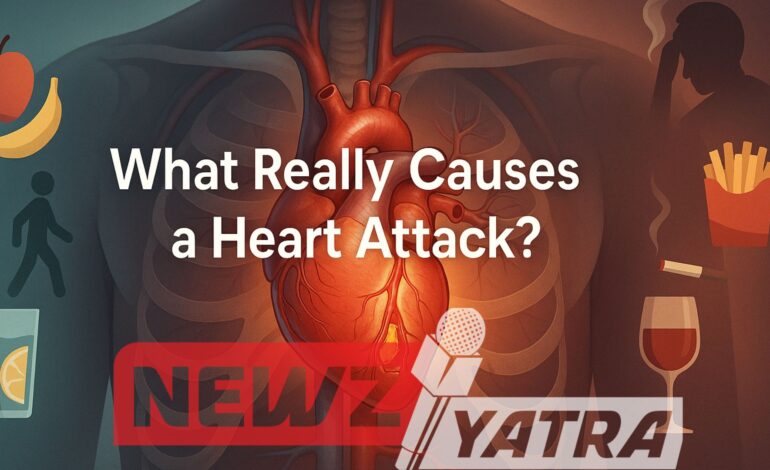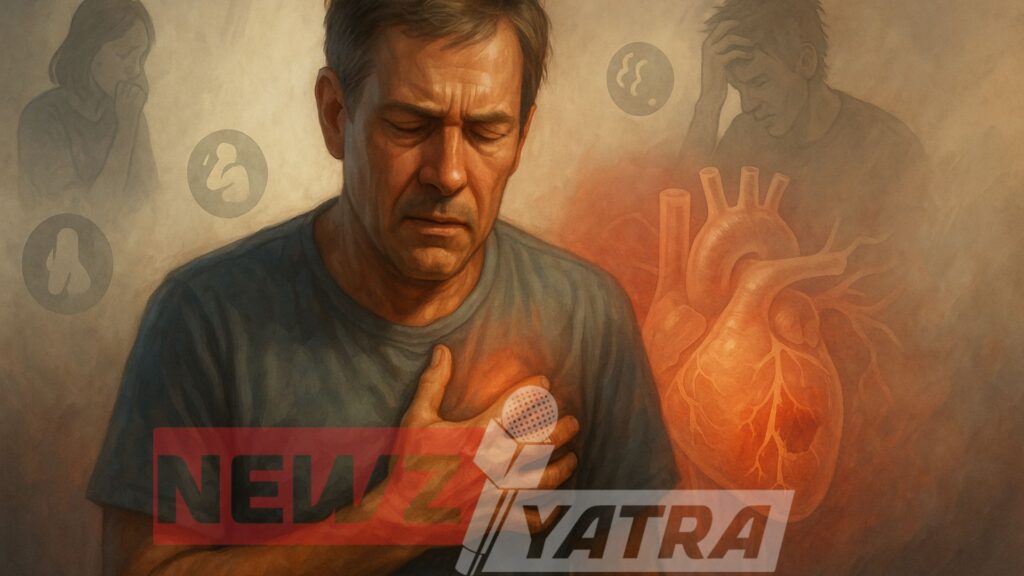What Really Causes a Heart Attack? Let’s Understand It the Easy Way

Imagine your heart as a hardworking engine. It never rests — not when you sleep, not when you’re tired, not even when you’re sad. It beats, quietly and faithfully, every second of your life.
But like any engine, your heart can break down. And when it does, it’s called a heart attack — and it’s no small thing. what are the causes of heart attack ?
But why does it happen?
What goes wrong inside your body?
And more importantly — can we prevent it?
Let’s break it down in a simple, conversational, and eye-opening way.
What Is a Heart Attack? what are the causes of heart attack ?
A heart attack (medically called myocardial infarction) happens when the blood flow to a part of your heart is suddenly cut off. Without blood, the heart muscle doesn’t get oxygen — and that part of the heart starts to die.
It’s like trying to run your car without petrol. It sputters. It stops.
But your heart doesn’t warn you loudly. It often starts with silent signs — a little pressure in your chest, shortness of breath, or fatigue. Ignore those signs, and the damage could be permanent.
Now let’s talk about what causes it.
What Really Causes Heart Attacks? A Closer Look at the Hidden Triggers what are the causes of heart attack?
Another major factor that silently increases the risk of a heart attack is high blood pressure. Often called the “silent killer,” it doesn’t show clear symptoms, but it constantly puts pressure on the walls of your arteries. (what are the causes of heart attack)Over time, this pressure damages the blood vessels, making them weaker and more prone to plaque buildup. It also forces your heart to work harder than it should, increasing the risk of heart failure and other complications. Regularly monitoring your blood pressure is crucial, especially since it can often be managed with simple lifestyle changes and, if needed, medication.
Your diet plays a bigger role in heart health than most people realize. Eating too much oily, salty, or sugary food — like fast food, fried snacks, and processed items — can raise levels of bad cholesterol and cause weight gain. (what are the causes of heart attack?) These foods don’t just affect your waistline; they actively damage your blood vessels and contribute to artery-clogging plaque. On the other hand, a balanced diet filled with fruits, vegetables, whole grains, and healthy fats can actually help clean your arteries and reduce your risk of heart attack significantly.
Smoking is one of the fastest ways to damage your heart and blood vessels. Every cigarette contains harmful chemicals that not only reduce the oxygen in your blood but also irritate and inflame your arteries. (what are the causes of heart attack?)This damage increases the chance of clots forming — the direct trigger for many heart attacks. Even secondhand smoke can raise heart attack risk, which is why quitting smoking is one of the best decisions you can make for your heart health — no matter how long you’ve been smoking.
A lack of physical activity is another hidden enemy. When we don’t move enough — whether it’s due to long office hours, screen addiction, or general fatigue — our heart doesn’t get the exercise it needs to stay strong. (what are the causes of heart attack?) A sedentary lifestyle slows down circulation, causes weight gain, and leads to poor metabolism. Over time, this increases your risk of high blood pressure, diabetes, and eventually, heart attacks. Just 30 minutes of walking, stretching, or light exercise a day can make a big difference.
Too much alcohol may not seem dangerous in the moment, but over time, it can raise your blood pressure, increase levels of unhealthy fats in your blood, and damage the heart muscle itself. (what are the causes of heart attack?) Many alcoholic drinks also contain added sugar and empty calories, which contribute to weight gain and liver stress. While occasional drinking in moderation might not be harmful, regular heavy drinking puts your heart at serious risk.
Family history and genetics also play a role in heart disease. If your parents or close relatives had heart problems, you are more likely to face similar issues. However, having a genetic risk doesn’t guarantee a heart attack. (what are the causes of heart attack?) It simply means you should be extra careful with your lifestyle — focusing on a healthy diet, exercise, and regular health checkups can help you avoid the same fate.
Diabetes is another powerful trigger for heart attacks. High blood sugar levels damage the inner lining of your blood vessels and interfere with the normal function of your arteries. Diabetic people also often have other risk factors like high cholesterol and obesity. (what are the causes of heart attack) This combination greatly increases the chances of a heart attack, which is why managing blood sugar levels through diet, exercise, and medication is so important.
People often underestimate the impact of stress and anxiety on their physical heart. When you’re constantly stressed, your body stays in “fight or flight” mode — releasing stress hormones that raise your blood pressure and heart rate. (what are the causes of heart attack) Over time, this weakens your heart and can even cause arrhythmias or irregular heartbeat. Chronic stress can also lead to unhealthy habits like smoking, overeating, or lack of sleep — which further increase heart attack risk.
Lastly, age and gender are natural factors that affect heart attack risk. (what are the causes of heart attack?) Men above the age of 45 and women above 55 are more likely to develop heart problems due to aging blood vessels and hormonal changes. However, due to modern lifestyle stress, unhealthy diets, and lack of activity, even younger people — especially those in their 30s and 40s — are increasingly falling victim to heart attacks.
So… Can You Really Prevent a Heart Attack? (what are the causes of heart attack?)
Absolutely, yes!
The truth is, around 90% of heart attacks can be prevented — not by expensive treatments or complex routines, but simply by making a few consistent lifestyle changes. It’s about taking care of your heart daily, just like you would for any important relationship. Below is a complete cheat sheet to help you protect your heart and give it the care it truly deserves. (what are the causes of heart attack?)

Here’s What You Should Start Doing Right Now:
Eat Real, Whole Foods
Focus on eating natural, unprocessed foods like fresh vegetables, fruits, whole grains, pulses, nuts, seeds, and healthy fats (like those from olive oil, avocado, and fish). These foods are packed with essential nutrients, antioxidants, and fiber that help reduce inflammation, lower cholesterol, and keep your arteries clear. Ditch packaged snacks and fried foods as much as you can — your heart will thank you. (what are the causes of heart attack?)
Move Your Body Every Day
Your heart is a muscle — and just like any muscle, it needs regular activity to stay strong. Aim for at least 30 minutes of moderate movement daily. This can be a brisk walk, cycling, dancing, or even gardening. You don’t have to join a gym — just make sure you’re not spending hours sitting in one place. Regular activity improves circulation, burns excess fat, regulates blood sugar, and boosts your mood. (what are the causes of heart attack?)
Quit Smoking Completely
If you smoke, quitting is the most powerful step you can take for your heart. Even “light” or occasional smoking seriously damages the inner lining of your arteries and reduces oxygen in your blood, making your heart work harder than it should. And don’t forget — secondhand smoke is almost just as dangerous. The benefits of quitting start showing within days and increase over time. It’s never too late. (what are the causes of heart attack?)
Learn to Manage Stress Effectively
Stress isn’t just “in your head” — it directly affects your heart. When you’re constantly stressed, your body produces hormones like cortisol and adrenaline that raise your blood pressure and heart rate. Over time, this puts wear and tear on your cardiovascular system. Try to incorporate relaxation techniques into your day — such as deep breathing, meditation, journaling, listening to music, or simply stepping outside for fresh air. Your emotional health matters. (what are the causes of heart attack?)
Stay Hydrated Throughout the Day
Water is vital for every cell in your body — including your heart. Proper hydration helps your blood flow smoothly and keeps your heart from working overtime. Dehydration can lead to thicker blood, which puts extra strain on your arteries and increases the risk of clots. Aim to drink at least 7–8 glasses of water daily, more if you’re active or live in a hot climate. Carry a reusable bottle to stay reminded. (what are the causes of heart attack?)
Prioritize 7–8 Hours of Quality Sleep
Your heart needs rest just like your mind and body. During deep sleep, your blood pressure naturally lowers, and your heart rate stabilizes — giving your cardiovascular system a break. Poor sleep habits, frequent late nights, or insomnia increase the risk of high blood pressure, diabetes, obesity, and heart attacks. Try to stick to a regular sleep schedule and create a calming bedtime routine to improve sleep quality.(what are the causes of heart attack?)
And Here’s What You Should Try to Avoid: (what are the causes of heart attack?)
Say Goodbye to Junk Food & Trans Fats
Processed snacks, sugary desserts, deep-fried items, and foods containing trans fats are your heart’s worst enemy. They raise bad cholesterol (LDL), lower good cholesterol (HDL), and promote inflammation inside your arteries. Over time, these foods can clog your arteries and trigger heart disease. Try to read labels — avoid anything with “hydrogenated” or “partially hydrogenated” oils. (what are the causes of heart attack?)
Avoid Long Hours of Sitting Still
Even if you exercise once a day, sitting for long stretches (like at your desk, on the couch, or during travel) slows circulation and negatively affects your metabolism. Make it a habit to stand up, stretch, or take short walks every hour, especially during work. Think of movement as medicine — the more you move, the healthier your heart becomes. (what are the causes of heart attack?)
Don’t Underestimate Even Occasional Smoking
Some people believe that smoking “just a little” or socially isn’t harmful — but the reality is, there is no safe amount of tobacco use. Even one cigarette a day damages blood vessels, raises blood pressure, and increases clot risk. If you’ve quit, stay strong. If you’re trying to quit, get support — every day without smoking makes your heart stronger. (what are the causes of heart attack?)
Don’t Bottle Up Your Emotions
Suppressing emotions, holding in anger, or living under constant stress has a deep impact on your physical health. Emotional tension triggers chemical changes in your body, raising heart rate and blood pressure. Instead of bottling up, try healthy outlets like talking to a friend, therapy, journaling, or creative expression. Mental peace leads to physical wellness. (what are the causes of heart attack?)
Limit Alcohol Consumption
While a small drink now and then might be fine for some, regular or excessive drinking raises your risk of high blood pressure, irregular heartbeat, obesity, and even direct damage to the heart muscle. If you drink, do so in moderation: generally, that means no more than one drink a day for women and two for men. And some people are better off avoiding it completely. (what are the causes of heart attack?)
Avoid Late Nights & All-Nighters
Irregular sleep patterns confuse your body’s natural rhythms and raise cortisol levels — making your heart work overtime. Staying up too late or frequently pulling all-nighters can weaken your immune system, disturb your metabolism, and contribute to heart strain. Try to wind down each night at the same time, and create a tech-free, calming environment for sleep. (what are the causes of heart attack?)
Your Heart’s Silent Message: Will You Listen Before It Breaks (what are the causes of heart attack?)
Your heart is not just a machine — it’s the silent hero of your life, beating faithfully through every emotion, every stress, every celebration, and every setback. But like any loyal companion, it needs your care, attention, and protection. (what are the causes of heart attack?)
What causes a heart attack is no longer a mystery. It’s the choices we make — daily habits, what we eat, how we handle stress, how active we are, and how we sleep. The good news? You have the power to change most of these things.
You don’t need to overhaul your life overnight. Start small. Walk a little more. Breathe a little deeper. Eat one healthy meal a day. Drink one extra glass of water. Every little change adds up — and your heart notices.
Remember, prevention is always better than cure. A few mindful changes today can prevent a lifetime of pain tomorrow.
So, the question isn’t “Can you prevent a heart attack?”
The real question is — Are you ready to start taking care of your heart, starting today?
Your heart is ready. Are you?
What Is Insurance? Complete Guide to All Types of Insurance Explained Simply!
FAQs
2. What are the early warning signs of a heart attack?
Common early signs include chest discomfort or pressure, shortness of breath, fatigue, nausea, dizziness, or pain in the arms, neck, or jaw. Some people — especially women — may experience more subtle symptoms.
3. Can a heart attack happen without chest pain?
Yes. Not all heart attacks cause chest pain. Some present as fatigue, breathlessness, or even back or jaw pain — especially in women, diabetics, and older adults.
4. What are the biggest risk factors for heart attacks?
Key risk factors include high blood pressure, high cholesterol, smoking, diabetes, obesity, poor diet, lack of physical activity, chronic stress, excessive alcohol intake, and genetic predisposition.
5. How does high blood pressure lead to a heart attack?
High blood pressure damages artery walls over time, making it easier for plaque to build up and eventually block blood flow — a direct cause of heart attacks.
6. Is it true that heart attacks are more common in men?
Yes, men are at higher risk earlier in life, but after menopause, women catch up in risk. Importantly, women often experience different and more subtle symptoms.
7. Can young people have heart attacks too?
Absolutely. Due to rising stress levels, poor diets, sedentary lifestyles, and smoking, heart attacks are increasingly affecting people in their 30s and 40s.






